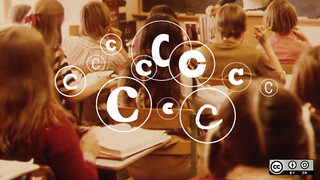Recently I’ve been thinking about copyright and fair use,
and specifically what we are telling students about these increasingly
important matters. I think a lot of times we shy away from talking to students
about copyright, because we are worried about giving them legal advice or
because we assume that they don’t care and won’t listen. However, I think it is
really important to talk to students about copyright, because we want them to
be responsible users of copyrighted
materials and responsible owners of copyrighted
materials. If we don’t talk to them about the important social and economic
issues around knowledge creation and production, where will they get their
ideas about copyright from? The people who are talking the most vocally about
it: big media conglomerates who have an interest in protecting their
intellectual property at all costs. And if we don’t teach our students about
fair use? Probably no one else will.
 |
| Flickr user: opensourceway |
At ACRL 2013 this past month, I attended a session of three conference paper presentations that all had something to do with copyright. Jean Dryden discussed how online archives struggle with how to educate their users about copyright, and ultimately often fail to do so. I think we (librarians and other information professionals) should be taking every opportunity to talk to our users about these issues, especially in the case of archives, where we are the copyright holders or at least stewards of those copyrights.
In the same session, James Neal, described the challenges
and dangers we face on the intellectual property landscape. Corporate media
interests and lobbyists are exerting pressure in Washington, D.C. for copyright
reform in their favor, and the new director of the U.S. copyright office is
indicating that she is looking for a new set of major copyright reforms. The Supreme
Court and other courts have recently taken on a number of cases around
copyright and intellectual property. Digital rights management is ever
encroaching on our ability to own and use copyrighted materials. What have we
been doing to be a part of or even a lead in these conversations? Neal pointed
out that when professional bodies create ‘best practices’ they often undermine
risk taking. In my favorite line of his talk, Neal reminded us, “Fair use is
not civil disobedience; it is our most important tool and must be preserved.”
Katie Fortney actually provided a great example of how we
can use and protect fair use in her talk describing the creation of the Grateful Dead digital archive. She described how they triaged the items going
into the collection, deciding if and how they would try to get permission from
the copyright holders. For the 23,000 items that they posted under the presumption
of fair use, they have received only 15 takedown notices and no claims of
copyright infringement. Fortney said that it is misguided to allow fears about
copyright guide our decisions about what to put into digital collections—we should
be trying to make the best and most useful collections and we can use fair use
to do so.
So what does this mean for reference and instruction librarians?
I find that opportunities to talk about copyright and fair use come up all the
time, and it is pretty easy to slip in some quick information about copyright.
When students want to search for images, I send them to Flickr and show the
advanced search options for Creative Commons licensed materials. When I cover
citations in instruction sessions, I bring in the concept of fair use. (Kevin Smith this week laid out the three questions he tells students (and faculty) to
ask themselves when considering fair use: “First, will the “quotation” of the
original help me make my point? Second, will it help my reader/viewer get
the point? Finally, did I use no more than necessary to make my point?”) In
fact, I’ve had very engaged discussions with first year students on these topics,
because these students have all run up against DRM when downloading or streaming
music and videos online. This is a great way to talk about ownership and
knowledge production, and to highlight the different norms in different
communities. This is precisely the kind of information literacy I want my
students to have because it so clearly translates from their academic selfs to
their social and professional selfs.
As I asked above, if we don’t talk to them
about these things, who will?

